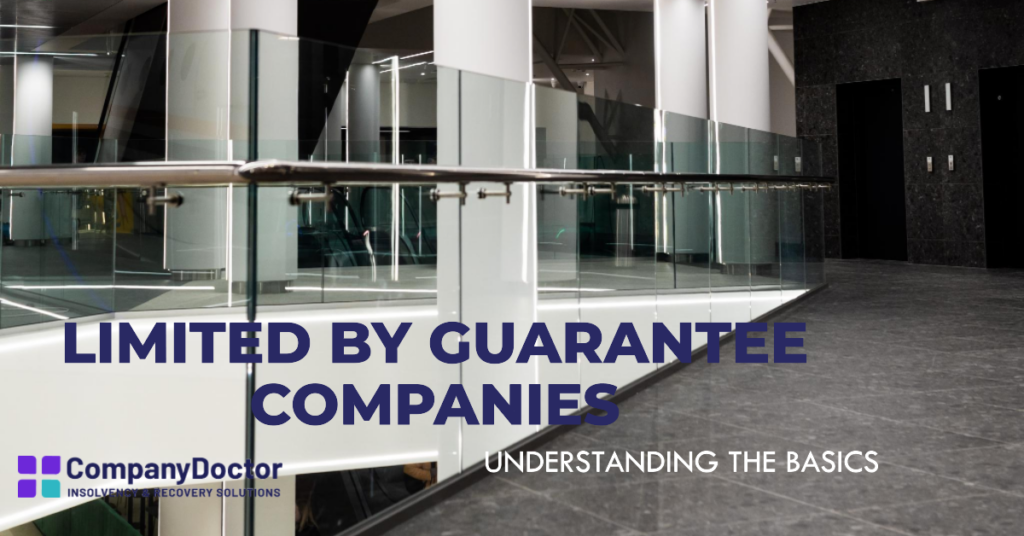In the diverse landscape of business structures, one type that stands out for its unique characteristics is a company limited by guarantee. This type of company is a popular choice for non-profits, charities, clubs, and other membership organisations, offering a distinct alternative to the more commonly known company limited by shares. This article delves into the topic of companies limited by guarantee.
A company limited by guarantee is a specific type of corporate structure where the financial responsibility of its members is limited to the amount they agree to contribute if the company is wound up. This amount is known as a ‘guarantee’. Unlike companies limited by shares, there are no shareholders or share capital involved. Instead, the company is owned by ‘guarantors’ who promise to pay this set amount towards company debts.
In the following sections, we will delve deeper into the concept of companies limited by guarantee, exploring their unique features, how they are set up, and their potential benefits and drawbacks. Whether you’re considering setting up a company limited by guarantee or simply wish to understand them better, this comprehensive guide aims to provide you with valuable insights.
Quick Links
- Understanding Companies Limited by Guarantee
- What is a Company Limited by Guarantee?
- Comparison with Other Types of Companies
- The Role of Guarantors
- Financial Liability of Guarantors
- Potential for Charitable Status
- Setting Up a Company Limited by Guarantee
- Step-by-Step Guide
- Advantages and Disadvantages of a Company Limited by Guarantee
- Frequently Asked Questions
- What is a company limited by guarantee?
- How is a company limited by guarantee different from a company limited by shares?
- Can a company limited by guarantee issue shares?
- Can a company limited by guarantee make a profit?
- Can a company limited by guarantee apply for charitable status?
- How do I set up a company limited by guarantee?
- Conclusion
- References
Understanding Companies Limited by Guarantee
A company limited by guarantee is a unique type of business entity primarily used by non-profit organisations, charities, clubs, and other membership-based bodies. Unlike a traditional limited company, a company limited by guarantee does not have any shares or shareholders. Instead, it is owned and controlled by individuals who act as its guarantors.
What is a Company Limited by Guarantee?
In a company limited by guarantee, the guarantors agree to contribute a predetermined amount, known as the ‘guarantee’, towards the company’s debts if it is wound up. This guarantee is typically a nominal amount, such as £1, and represents the guarantor’s maximum financial liability.
These companies are typically used for non-profit organisations where securing profit is not the main objective. Instead, any profits made are reinvested back into the company to further its non-profit objectives. This structure is particularly popular among charities, community projects, clubs, and social enterprises.
Comparison with Other Types of Companies
The primary difference between a company limited by guarantee and a company limited by shares lies in the distribution of profits and the nature of the owners’ financial liability. In a company limited by shares, the company’s profits can be distributed to shareholders in the form of dividends. The shareholders’ financial liability is limited to the value of their shares in the company.
In contrast, a company limited by guarantee does not distribute its profits to its members. Instead, any profits are reinvested back into the company to further its objectives. The members’ financial liability is limited to the amount they have agreed to contribute as a guarantee.
Freephone including all mobiles
The Role of Guarantors
In a company limited by guarantee, the guarantors play a crucial role. They are the individuals who control the company and make decisions about its operation. They have a responsibility to contribute towards the company’s debts up to the amount of their guarantee if the company is wound up.
Financial Liability of Guarantors
The financial liability of guarantors in a company limited by guarantee is limited to the amount they agree to contribute towards the company’s debts in the event of winding up. This amount is known as the ‘guarantee’. It is typically a nominal amount and represents the maximum amount that the guarantor is liable for.
Potential for Charitable Status
One of the key advantages of a company limited by guarantee is its potential for charitable status. If the company’s objectives are charitable and it operates for public benefit, it may be eligible for registration as a charity with the Charity Commission. This can provide significant benefits, including tax exemptions and access to certain types of funding.

Setting Up a Company Limited by Guarantee
Setting up a company limited by guarantee involves several key steps, including registering the company with Companies House and drafting the company’s Memorandum and Articles of Association.
Here is a visual representation of the process:
Step-by-Step Guide
- Register the Company: The first step in setting up a company limited by guarantee is to register the company with Companies House. This involves choosing a unique company name, providing the details of the company’s registered office, and providing the details of the company’s directors and guarantors.
- Receive Company Registration Number: Once the company is registered, Companies House will provide a unique company registration number. This number is used to identify the company in all its dealings with Companies House and other government bodies.
- Draft the Memorandum and Articles of Association: The Memorandum and Articles of Association are key documents that set out the company’s constitution and govern its operation. The Memorandum of Association includes the company’s name, location, and objectives. The Articles of Association set out the rules for running the company, including the rights and responsibilities of the directors and guarantors, the procedures for making decisions, and the procedures for winding up the company.
Once these steps are completed, the company limited by guarantee is legally established and can begin operating.
Advantages and Disadvantages of a Company Limited by Guarantee
Like any business structure, a company limited by guarantee has its own set of advantages and disadvantages. Understanding these can help you make an informed decision about whether this type of company is the right choice for your needs.
Advantages
- Limited Liability: One of the main advantages of a company limited by guarantee is the limited liability of its members. This means that the personal financial risk to the guarantors is limited to the amount they agree to contribute to the company’s assets if it is wound up.
- Charitable Status: Companies limited by guarantee are often used by non-profit organizations because they can apply for charitable status. This can provide significant benefits, including tax exemptions and access to certain types of funding.
- Reputation: Companies limited by guarantee are often perceived as more formal or professional than unincorporated associations or trusts. This can enhance the company’s reputation with potential funders, partners, and the public.
- Perpetual Succession: A company limited by guarantee has its own legal identity separate from its members. This means it can continue to exist even if its members change, ensuring continuity of operations.
Disadvantages
- Regulatory Requirements: Companies limited by guarantee are subject to more regulatory requirements than unincorporated associations. For example, they must file annual accounts and returns with Companies House.
- Complexity: Setting up and running a company limited by guarantee can be more complex than other types of organizations. This can make it a less suitable choice for small, informal groups.
- Public Disclosure: Information about a company limited by guarantee, including its accounts and details of its directors, is publicly available. Some organizations may prefer a more private structure.
- No Share Capital: Companies limited by guarantee do not have a share capital or shareholders. This means they cannot raise funds by issuing shares, which may limit their fundraising options.
Frequently Asked Questions
Here are some common questions people often ask about companies limited by guarantee:
What is a company limited by guarantee?
A company limited by guarantee is a type of company where the liability of its members is limited to the amount they agree to contribute to the company’s assets if it is wound up. These types of companies are typically used by non-profit organizations, clubs, and charities.
How is a company limited by guarantee different from a company limited by shares?
In a company limited by shares, the company’s capital is divided into shares which are owned by shareholders. The shareholders’ liability is limited to the amount unpaid on their shares. In contrast, a company limited by guarantee does not have a share capital or shareholders. Instead, it has members who act as guarantors.
Can a company limited by guarantee issue shares?
No, a company limited by guarantee does not have a share capital and therefore cannot issue shares. This is one of the key differences between a company limited by guarantee and a company limited by shares.
Can a company limited by guarantee make a profit?
Yes, a company limited by guarantee can make a profit. However, any profits must usually be reinvested back into the company to further its objectives, rather than being distributed to members.
Can a company limited by guarantee apply for charitable status?
Yes, a company limited by guarantee can apply for charitable status if its objectives are charitable, it benefits the public, and it complies with the relevant charity law requirements.
How do I set up a company limited by guarantee?
Setting up a company limited by guarantee involves registering the company with Companies House, drafting the company’s Memorandum and Articles of Association, and complying with other legal requirements. For more detailed information, refer to the section “Setting Up a Company Limited by Guarantee” in this article.
If you need further assistance with setting up a company limited by guarantee or dealing with an insolvent company, feel free to contact us at Company Doctor. We are licensed insolvency practitioners based in Leeds, offering advice and solutions to struggling directors with insolvent companies. We provide Creditor’ Voluntary Liquidations. Call us at 0800 169 1536 or leave an enquiry on our website.
Conclusion
Companies limited by guarantee offer a unique structure that is particularly beneficial for non-profit organizations, clubs, and charities. They provide the benefits of limited liability and the potential for charitable status, while ensuring that any profits are reinvested back into the company to further its objectives.
However, like any business structure, they also come with their own set of challenges and requirements. It’s important to fully understand these before deciding to set up a company limited by guarantee.
If you’re considering setting up a company limited by guarantee, or if you’re a director struggling with an insolvent company, we at Company Doctor can help. We are licensed insolvency practitioners based in Leeds, offering advice and solutions tailored to your situation. We provide Creditor’ Voluntary Liquidations and other services to help you navigate through difficult times.
Call us today at 0800 169 1536 or leave an enquiry on our website. Let us help you make the best decisions for your company’s future.
References
The primary sources for this article are listed below.
Companies House – GOV.UK (www.gov.uk)
The Charity Commission – GOV.UK (www.gov.uk)
Set up a private limited company: Limited companies – GOV.UK (www.gov.uk)
Details of our standards for producing accurate, unbiased content can be found in our editorial policy here.

